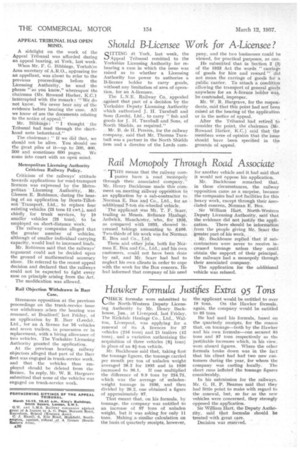Rail Monopoly Through Road Associate " r fIS means that the
Page 32

If you've noticed an error in this article please click here to report it so we can fix it.
railway companies have 'a. road 'monopoly through their associated company." Mr. Henry Backhouse made this comment on meeting railway opp6Sition to an application by a sub-contractor to Norman E. Box and Co„ Ltd., for an additional 7-ton six-wheeled vehicle. The applicant was Mr. T. F., Scarr, trading as Messrs. Reliance Haulage, Ardwick, litlanchoster, Who, for 1936, as compared with 1935, showed increased takings amounting to 4400. Two-thirds of his work was for Norman E. Box and Co., _Ltd.
TheSe and other jobs, both for Norman E. Bee( and Co., Ltd.; and his own customers, could not have been done by rail, and Mr. Scarr had had to neglect his own clients in order to cope with the work for the Box concern. He had informed that company of his need for another vehicle and it had said that it would not oppose his application.
Mr. Backhouse remarked that, in these circumstances, the railway opposition came as a surprise, because the companies had not facilities for this heavy work, except through their associated concern, Norman E. Box, Sir William Halt, North-Western • Deputy Licensing Authority, said that the evidence did not justify the appli. ration. There should be information
• from the people giving Mr. Scanthe greater part of his work.
. Mr. Backhouse replied that if subContractors were never to receive increased tonnage unless they could obtain the support of their principal, the railways had a monopoly through their associated company.
The application for the additional vehicle was refused.




















































































